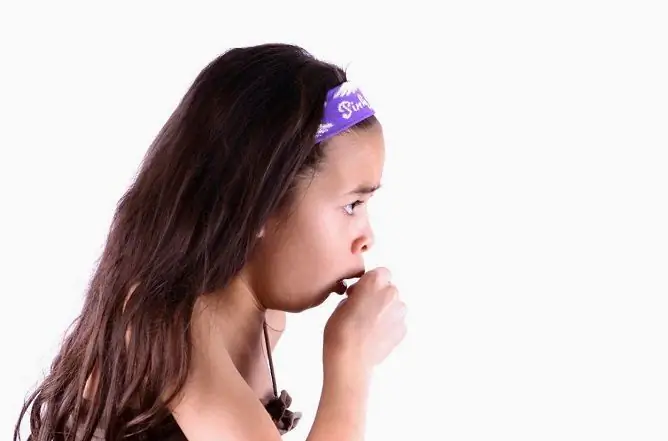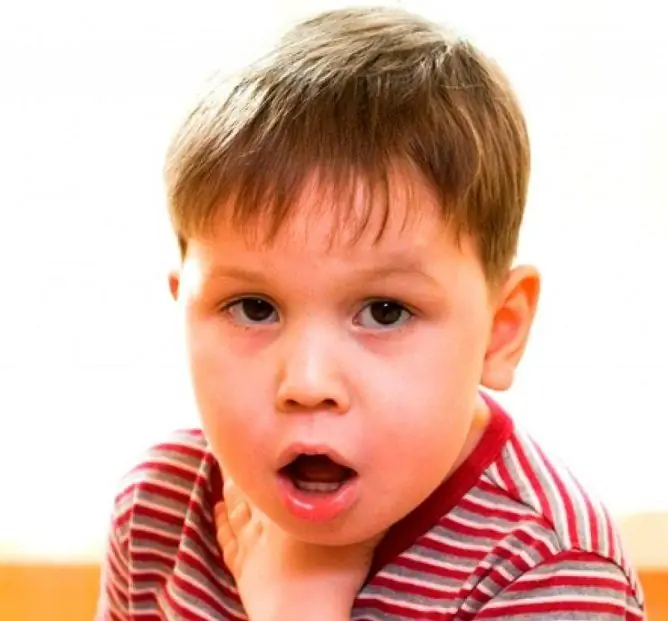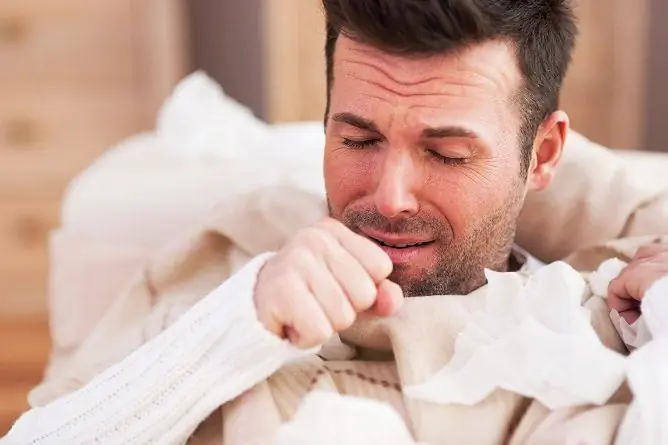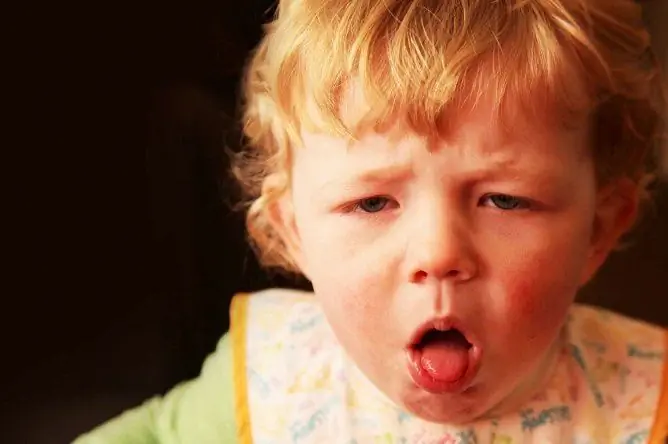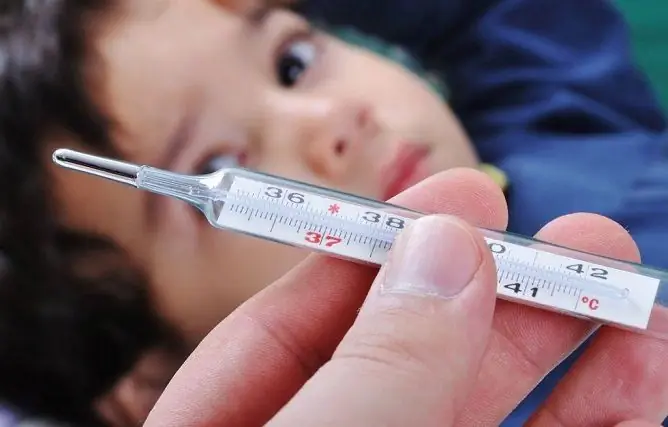- Author Rachel Wainwright [email protected].
- Public 2024-01-15 19:51.
- Last modified 2025-11-02 20:14.
How to treat a dry cough in a child without fever
The content of the article:
-
Severe dry cough in a child without fever: home treatment
- Drug treatment
- Inhalation
- Folk remedies
- Prevention
- Types of cough
- Causes and symptoms
- Why is a dry cough dangerous?
- Diagnostics
- Video
The question of how to treat a dry cough without fever in a child is often asked by parents to doctors. It is impossible to give an unequivocal answer to it, since this symptom can occur in a baby under the influence of a wide variety of reasons. Let's take a look at these reasons, and also talk about how to help a child at home.
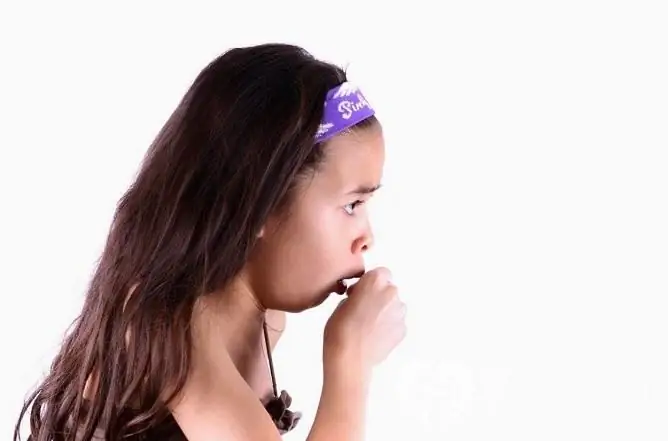
Dry cough without fever can be caused by various reasons
Severe dry cough in a child without fever: home treatment
To reduce the intensity of dry cough in children, it is important to maintain an optimal temperature (20-22 ° C) and humidity in the room.
Drug treatment
Drug therapy for dry cough should only be performed as directed by a physician. The following drugs can be used:
- Codeine, Methylmorphine, Tussal. They belong to the opioid group. Suppress the activity of the cough center in the brain. May be addictive. It is prescribed only for dry, unproductive cough for children aged 12 years and older. In extreme cases, young children can also be prescribed.
- Glaucin, Sinekod, Butamirad. Centrally acting antitussives. Their use does not lead to the formation of drug dependence. Indicated for unproductive debilitating cough in children over three years old.
- Mukaltin, Ambroxol, Licorice Syrup. Contribute to liquefaction of phlegm and improve its coughing up. Pediatricians, including Komarovsky, do not recommend expectorants for children under the age of three.
- Antihistamines (Zodak, Tavegil, Suprastin). Drugs in this group are prescribed for allergic cough, allergic bronchitis and bronchial asthma.
- Antibiotics. Antibacterial drugs are prescribed when a dry cough is caused by a bacterial infection.
Inhalation
A good therapeutic effect for dry, unproductive cough in children is provided by inhalations carried out with a nebulizer. This type of inhalation allows the drug to be delivered directly to the inflammatory focus, while steam inhalation does not penetrate beyond the pharynx (and is generally not recommended for children).
As a medicinal solution used:
- alkaline mineral waters;
- soda solution;
- physiological solution (0.9% aqueous sodium chloride solution);
- expectorant drugs.
For inhalations to be as effective as possible, the following rules should be followed:
- Mucolytics and expectorants should not be taken before the procedure.
- Carry out the procedure no earlier than 1.5 hours after eating.
- During inhalation, the child should not talk, read.
- After the end of inhalation, you should eat, drink and talk no earlier than 15-20 minutes.
Contraindications for inhalation are:
- purulent tonsillitis;
- increased tendency to nosebleeds;
- heart failure.
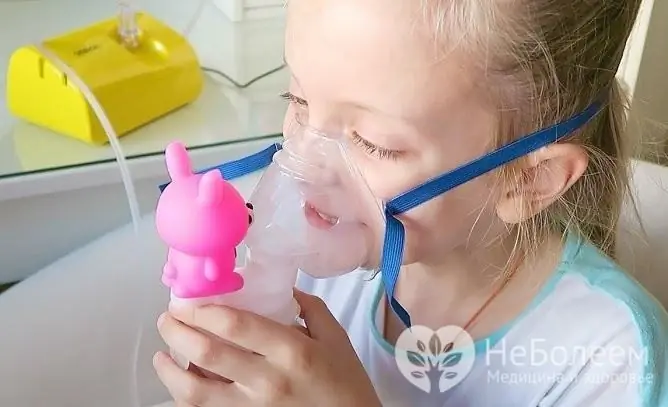
For some types of dry cough, inhalation with a nebulizer is effective
Folk remedies
Traditional medicine also has a good effect on dry cough without fever in children, if they are used correctly. They should be carried out only in consultation with the attending physician. This is due to the fact that any medicinal herbs can cause allergic reactions, and there is a whole list of contraindications to their intake.
Consider the most commonly used herbs in dry cough therapy:
| Name | Therapeutic action | Contraindications and side effects |
| Chamomile officinalis | Diaphoretic, antiseptic, anti-inflammatory | Allergic reactions |
| Calamus swamp | Antibacterial, anti-inflammatory | Strengthens the secretory function of the stomach, therefore it is not prescribed for gastritis with high acidity, gastroesophageal reflux disease |
| Aloe | Antibacterial, antiviral, antifungal, immunostimulating | Cystitis, liver and gallbladder diseases, increased bleeding |
| Mountain arnica | Suppresses the activity of the cough center | The plant cannot be used in pediatric practice (poisonous) |
| Ledum | Expectorant, bronchodilator, antiseptic | The plant is poisonous, can cause the development of acute erosive gastritis. Forbidden to use for the treatment of children |
| Periwinkle | Suppresses pathogenic microflora, promotes tissue regeneration | The plant is poisonous, it is forbidden to use it to treat children |
| Belena (dope) | Relieves bronchospasm | Even one seed of this plant can cause death. |
| St. John's wort |
Antiseptic, anti-inflammatory |
If the recommended dosage is violated, taking a decoction leads to the development of severe toxic reactions |
| Ginseng | Immunostimulating, psychostimulating | Long-term use leads to persistent headaches, arrhythmias, insomnia |
| Wild poppy | Suppresses the activity of the cough center | The composition includes opiate-like substances. It is forbidden for use in pediatric practice, as the plant can cause respiratory problems and addiction |
| Radish | Antiseptic, expectorant | Contraindicated for children with diseases of the cardiovascular and urinary system |
| Thermopsis | Expectorant | Thermopsis should not be prescribed for tuberculosis |
| Ephedra two-spike | Bronchodilator | The plant is poisonous. Forbidden to use for the treatment of children |
Prevention
Prevention of unproductive cough in children includes the following measures:
- hardening procedures (air and sun baths, contrast showers, douches);
- regular walks in the fresh air;
- playing sports;
- proper nutrition with the obligatory inclusion of fresh vegetables and fruits in the diet;
- timely vaccination against influenza, whooping cough.
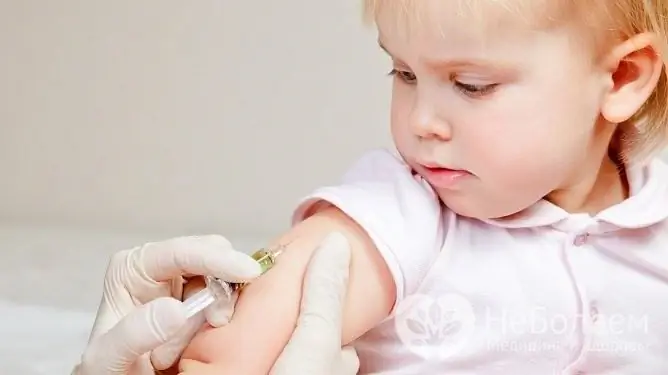
Vaccination is the most effective method for preventing whooping cough
Types of cough
A cough in which sputum does not separate is called dry, and a cough accompanied by mucous or purulent sputum is called wet.
Depending on the reasons, duration and some other features, several types of dry cough are distinguished:
- Dry cough without fever. Usually occurs at the very beginning of inflammatory processes affecting the organs of the respiratory system (pharyngitis, tracheitis, bronchitis, pneumonia). It manifests itself mainly in the daytime and, against the background of the treatment being carried out, quickly turns into a wet productive cough.
- Lingering cough at night. After suffering an acute respiratory viral infection, a child may have a dry cough for a fairly long time (over two weeks), the attacks of which often occur in the evening and at night.
- Paroxysmal (whooping cough) cough. During an attack, the child develops a series of spastic cough jerks, interrupted by a wheezing breath. At the end of the attack, vomiting often occurs.
- Recurrent cough. Periodic paroxysmal cough, which is often combined with symptoms of rhinitis and conjunctivitis. Its appearance is often one of the symptoms of an allergic reaction.
- Constant coughing. During the day, the child has single cough tremors. At the same time, the general condition remains satisfactory.
Causes and symptoms
Parents need to know that dry cough is not an independent disease, but a symptom of a particular disease.
Most often, dry cough without fever is caused by:
- Sluggish respiratory infections. With nasopharyngitis in a child, in addition to an unproductive cough, a runny nose, sore throat are noted. Laryngitis is characterized by a rough barking cough.
- Adenoids. This is the most common cause of dry cough in children 4 to 11 years old. Nasal mucus, when the child is in a horizontal position of the body, begins to flow into the pharynx and irritates the nerve receptors present here. This leads to coughing.
- Allergy. An allergic reaction is characterized by the presence of a dry, unproductive cough, conjunctivitis, rhinitis.
- Whooping cough. Children's infectious disease, which is characterized by a long-lasting paroxysmal cough. In recent years, there has been an increase in the incidence of whooping cough, which is explained by the refusal of many parents from preventive vaccinations and unreasonable medical withdrawals from them.
- Unfavorable ecological situation. A dry cough can also appear in a child when inhaling air with a high content of various pollutants (smoke, exhaust gases, aerosols).
- Dry air. In a room with central heating or an air conditioning system in operation, a decrease in the relative humidity of the air is noted. Dry air causes dryness and irritation of the mucous membranes, which leads to a dry cough.
- Helminthic invasions. The waste products of the worms contribute to an increase in the allergization of the child's body, which causes a dry cough.
- Gastroesophageal reflux disease. Due to the weakness of the lower esophageal sphincter, acidic gastric contents are thrown into the esophagus, from where it enters the pharynx, irritates the receptors and provokes a dry cough. A characteristic feature of gastric cough is its combination with heartburn.
- Heart failure. A decrease in the contractility of the left ventricle of the heart leads to the fact that the blood begins to stagnate in the vessels of the pulmonary circulation. This contributes to the swelling of the bronchial mucosa and the occurrence of heart cough.
- Neurogenic cough. Usually seen in adolescents. It occurs at a moment of intense excitement and disappears without any treatment at rest.
Why is a dry cough dangerous?
A dry cough is far from harmless, especially in a child. With its long-term preservation, difficult-to-separate sputum accumulates in the lumens of the bronchi, as a result of which a number of complications can develop:
- hypoxia of the brain;
- chronic obstructive bronchitis;
- bronchial asthma;
- sinusitis;
- otitis.
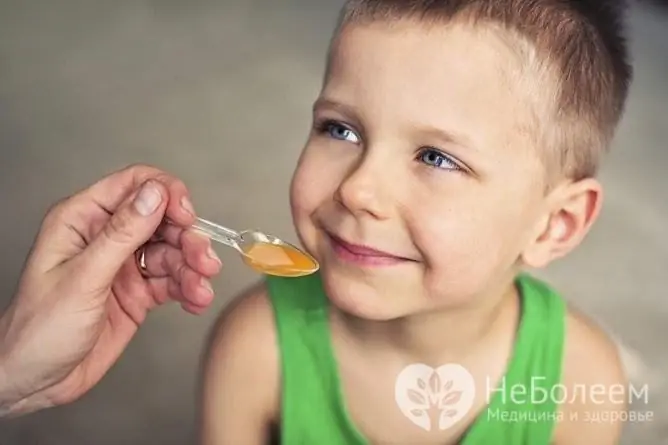
Any cough medicine should be given to children only after consulting a doctor.
Diagnostics
The causes of dry cough in children without fever can be different. They can only be established by a doctor after conducting the necessary examination.
Diagnostics begins with the examination of the child by a pediatrician. If indicated, the doctor may prescribe the following types of research:
- chest x-ray;
- bronchoscopy;
- gastroscopy;
- Ultrasound of the abdominal organs;
- ECG and Echo-KG;
- general and biochemical blood test.
Depending on the results obtained, the pediatrician can refer the baby for consultation to narrow specialists (pulmonologist, ENT doctor, phthisiatrician, allergist, gastroenterologist or cardiologist).
Video
We offer for viewing a video on the topic of the article.
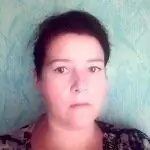
Elena Minkina Doctor anesthesiologist-resuscitator About the author
Education: graduated from the Tashkent State Medical Institute, specializing in general medicine in 1991. Repeatedly passed refresher courses.
Work experience: anesthesiologist-resuscitator of the city maternity complex, resuscitator of the hemodialysis department.
Found a mistake in the text? Select it and press Ctrl + Enter.

